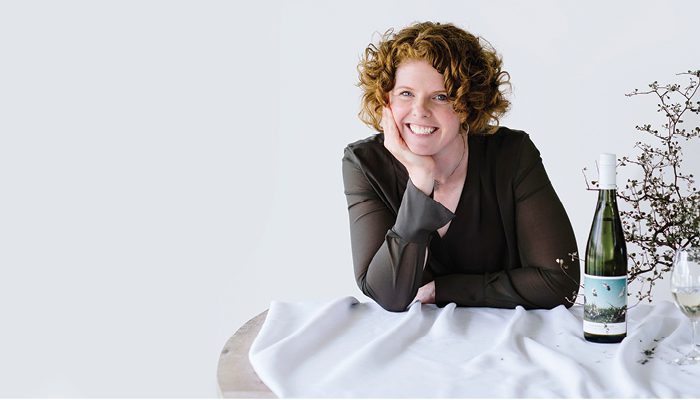
Sarah Collingwood’s open, honest approach to small business and digital wine marketing hits all the right spots.
When Sarah Collingwood was a little girl she wanted to be an opera singer. “Opera singers have big boobs, great outfits and large voices so that’s what I wanted to be.” Unfortunately she didn’t have the set of pipes to support the dream. “I can’t sing!” Sarah smiles. Her impressive mop of red curls bounce as she talks. Her excitement and energy are infectious. She has a lot to be happy about. On 26 September, at an awards ceremony in London, she was named owner/operator of the year at the Australian Women in Wine Awards. It’s a big deal for a little family-run business.
Sarah manages Four Winds Vineyard alongside husband John and parents Suzanne and Graeme Lunney. Their cellar door and vineyards are located near Murrumbateman, north of Canberra. It’s a pretty spot, just a few kilometres from Clonakilla wines. “They are very nice neighbours to have,” Sarah says. “My parents bought the farm in 1998 and I helped them lay it out as a vineyard.” The 33-acre site was planted with shiraz, riesling, cabernet, merlot and sangiovese. The setting was lovely but Sarah was on a gap year and had adventure in her heart. “I was like, ‘Oh my goodness I don’t want to be a farmer.’ It was so much hard work.”
Instead, she moved to Sydney and worked for the NBC who had the broadcasting rights to the 2000 Summer Olympic Games in Sydney and the 2002 Winter Olympics in Salt Lake City. “I was on the Olympic wagon for a while.” When she wasn’t troubleshooting or managing volunteers, Sarah worked on her own wine label Rewined. She used wine from her mum and dad’s property and sold it at markets across Canberra. “It was wine in one-litre reusable bottles with the Grolsch-style top. People would pay $14 then bring back the bottle for three dollars off their next purchase.”
At 24 she also ran a small marketing business, specialising in communications and event management. “I was always told you can go bankrupt before you’re 30 and be fine so I threw everything into them, confident that if it didn’t work I’d change and do something else.” Sarah sold Rewined, closed her little business and moved to Melbourne in 2008 where she met John.
Sarah and John have a passion for mountain biking and met during a group ride. Love blossomed and they moved to Geelong where John worked as a physiotherapist. Their sea change came in 2010, when they returned to Four Winds to work with her mum and dad. She did so with new skills and confidence under her belt. “I felt I could say ‘Okay, here’s what we need to do to make this business work’. When you’re working on large events like the Olympics you really have to make sure you deliver.”
They never expected to stay on the farm. “We loved living in Geelong and had a house down there but moved [back to Murrumbateman] because my older brother, Tom, had been unwell for a while. He was helping Mum and Dad run the farm and unfortunately, not long after we got up here, he passed away. It was so sad.” He was just 32.
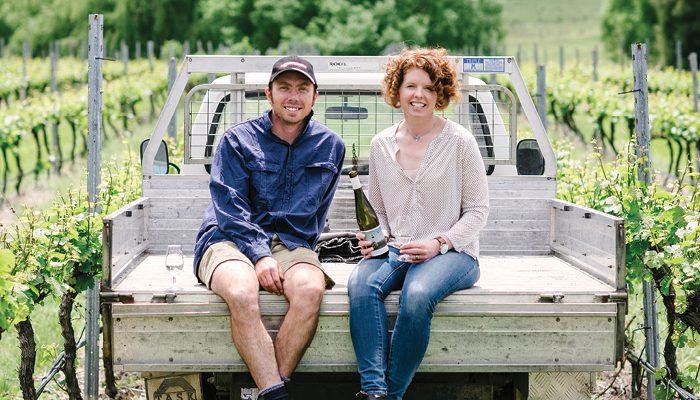
The family banded together and put their heart and soul into the place. Sarah and John married soon after returning to the farm and are the proud parents of two daughters aged two and five. “That was nearly eight years ago now and we’re just totally loving it. John loves being a farmer. It makes him laugh… watching YouTube videos on how to service a two-stroke engine and how to pull things apart and then put them back together. He’s totally found his niche, which is great. It seems like a long time to study physiotherapy to then become a farmer, but if he’s doing it for the next 40 years then that’s okay.”
Sarah talks a lot about their four-decade plan. “For us Four Winds is a marathon. We want to be doing this and we’ve been putting together our 40-year plan. How are we going to be doing this in 40 years? What do we want to be doing and what’s it going to look like? We not only want to keep the business interesting but make sure people enjoy coming here, drinking our wine and being here with us as well.”
Sarah looks after the business management and marketing side of things, while John takes care of the vineyard. “We all do a bit of everything as in any sort of business. Mum and Dad are in more of an advisory role now. Mum is a very good tractor driver so is on the tractor during harvest. They both help out at the cellar door every weekend. They’re not pruning and don’t want to do any of the vineyard work anymore, which is good.” You will, however, spot Suzanne tending to the 200 rose bushes around the vineyard.
“It’s been great,” Sarah says. “I had never planned on coming back to the farm but it happened and now I can’t imagine doing anything else. Working with Mum and Dad is fantastic. Dad and I in particular have a great working relationship. We both bring something different to the table … he was in law [a barrister] and has a lot of experience. He’s a great business advisor to have. Mum is so practical. She balances out any crazy idea with, ‘Okay, how are we going to do this?’”
Sarah’s sister Jaime and brother-in-law Bill Crowe make the wines. The couple started their custom crush business, Highside Winemaking, in early 2016, before which they were winemakers for Four Winds Vineyard for five years. Jaime kicked her career off with a forensic biology degree and spent two years working in a pathology laboratory then the laboratory at the Hardy Wine Company’s Kamberra complex where she worked two vintages.
Bill, from the Napa Valley, spent 10 years working under the direction of winemaker Scott Harvey of Scott Harvey Wines in California. They met in Napa Valley and Bill eventually joined Jaime in Australia. “They make other people’s wines as well,” Sarah says. “I guess our philosophy is growing absolutely the best grapes we can to make sure that what’s in the winery is really reflecting the great grapes we can grow in the Canberra district.”
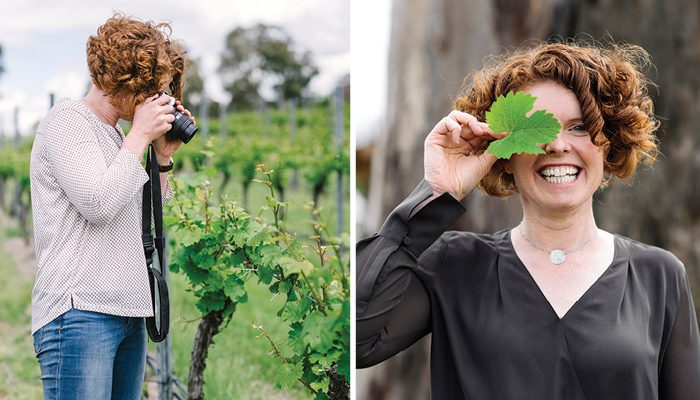
The 29,000 vines are hand-pruned to ensure each plant has the best start to the season and leaf plucked to allow air and light into the canopy. Fruit dropping and shoot thinning helps, too. Come harvest time, the grapes are handpicked.
“We’re very hands on. That side of the job is a big one. We do get quite a bit of help in. We used to do the pruning ourselves but that was three months of full-time work and was not the best use of our time. We’re a cold climate and have frost some years. We’re just trying to manage it as much as we can to make sure we get the fruit off every year.”
At three thousand cases a year, export isn’t on the horizon – yet. “It’s part of the 40-year plan.” She laughs. The range of six varieties are available online and at the cellar door which has been up and running for four years. “We wanted to keep it simple. We got a federal grant in 2012 so we had to finish it in 2013. The building is actually a very simple one: it’s got a skillion roof over a single room.” The cellar door serves cracking wood-fired pizzas. “We’d obviously been to a lot of wineries and seen what worked and what didn’t but we were also lucky that our neighbours were so generous. They gave us their thoughts on the region and the kind of food that we could put on. Quite a few of our neighbours said, ‘Don’t do any food that requires a chef because Canberra has the highest number of restaurants per capita in Australia and if they want a job they can stay in Canberra, rather than drive 30 minutes out to Murrumbateman.”
The cellar door is located in the northwest corner of the property in a riesling block. “It’s a good site, gently sloping from south to north and facing north. People drive through the vines and can see them when they’re sitting out there drinking wine and eating pizza.”
They also host weddings and are booked out for over 12 months. It’s all great Instagram fodder. Sarah manages the company’s wine club and digital marketing. It’s a big job. “Social media for small business is just so valuable.”
Transparency is key. When things go wrong, she posts the results on social media. Like the time fierce wind snapped the posts on their first row of sangiovese. Or the time a snake made its way into the winery. “John was up on the barrels trying to get it.” She smiles. “This is what it’s actually like. If we put up the good we’ve got to make sure we put up the bad.” She pauses. “It can be tough. When we had bad frost one year I posted a photo of little shriveled riesling grapes. It totally broke our hearts. We’ve got to show people that it isn’t all easy. I couldn’t imagine running this business without social media.”
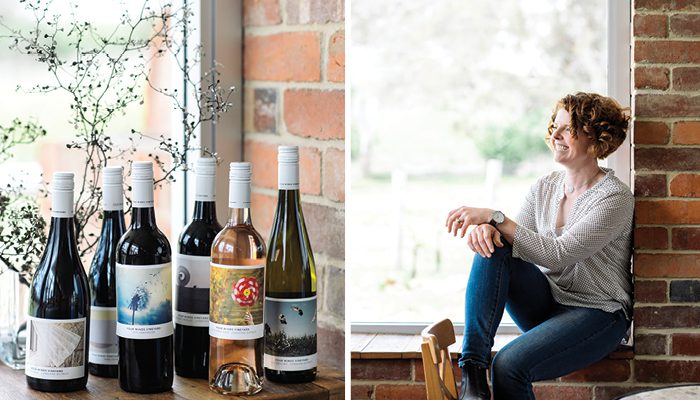
She says video is powerful. “We bought a drone because I love making videos. It’s a good way to show what’s going on. We got the Mavic Pro and the quality of the video is just amazing. There’s a lot of room for creativity in the business.”
The Four Winds Vineyard Wine Club members receive shipments of six bottles every six months (April and October), 20 percent off all wine purchased from the website or the cellar door, the first choice of limited production wines, and access to exclusive wine club events. There is no cost to join and they aim to keep shipments under $150 (excluding postage).
In an ever-evolving industry Sarah is on a mission to expand her skill base. “We have so much to learn through this business. I keep thinking that maybe I should go back and learn accounting or economics… something that’ll help me run the business a bit better.” She’s on the right track and recently graduated from a four-month national Future Leaders Program, a combined initiative of Wine Australia, the Winemakers’ Federation of Australia (WFA) and Australian Vignerons. “It’s been such an amazing course. The facilitators brought in really interesting speakers. I thought we’d learn about being leaders and whatever that encapsulated, but it was more about self-development, personal skills and learning about yourself, your values and how to have difficult conversations.”
The trip to London for the Australian Women in Wine Awards (and a side trip to Paris with a bunch of female winemakers) was also a chance to soak up inspiration. The awards were established in 2015 by The Fabulous Ladies’ Wine Society to increase gender diversity in the industry. Accolades are one thing but meeting and mixing with 60 wine industry peers was invaluable. “Being able to talk to them and see what they’re doing with their businesses was amazing. We are from such a small region, we’ve only got 35 cellar doors in the area and sometimes it feels like a long way from the rest of the industry. Eliza and Angela Brown were just so generous with their knowledge. They said, ‘If you’re ever having any trouble we’ve been doing this for years, and we’ve made all the mistakes so give us a call’. There’s so much generosity in the industry.”
Has she made mistakes? “Oh gosh. I’ve made so many. John is very good at remembering mistakes. I’m probably the over-optimistic one and he’s a bit more realistic. If somebody rings up in the morning and says, ‘I’ve got a huge group can we come in?’ I say, ‘Oh, yes we can definitely fit you.’ Meanwhile John is in the background mouthing, ‘No!’ I think we’re a nice balance for each other.”
For Sarah, the most challenging part of the industry is cashflow, growth and staffing and how those three things interlock. “That’s what we’re trying to work out at the moment because we are only open on weekends. We want to open more days but how does that look with staffing? How do I balance that with picking up the kids from school and how do we make it all work? Then there’s growth and what direction to expand. Do we keep growing the cellar door or should we be looking to increase our distribution sales to Melbourne and Sydney? There are a million different business models in the wine industry that work, not just one. I think we just have to find the model that works for us.”
Accolades help validate decisions. Like the two international awards they received after changing their labeling in 2016. “They give you real confidence that we chose the right path and we’re going in the right direction. We have to keep evolving.”
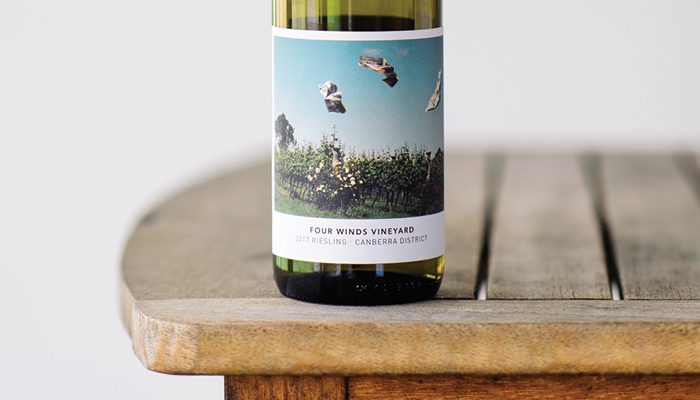
What’s on the horizon?
“There’s a lot of discussion about whether or not we start charging for tastings. We don’t at the moment except for groups but we are keen to.” She pauses, thoughtful. “I’ve been talking a lot to Mary Hamilton [Hugh Hamilton Wines] because she was also in the Future Leaders course. She started charging 20 dollars for tastings and you get a little cheese platter and a sensory experience. It’s excellent but we’re not well set up for that. Some days we’re so busy we’re reaching across people to pour wine… I’m trying to work out how we make it a better experience.”
Sarah is happiest when she’s looking out over the riesling block. “I feel so grateful when I drive up to Sydney and I’m sitting in traffic thinking, ‘People do this every day?’ My commute is walking down through the riesling block. Running a small business means we don’t sit down a lot and enjoy it but having my kids able to ride their bikes down to the cellar door at the end of the day on a Saturday and come say, ‘Hi’ is wonderful.”
Branding
“When we changed our labels in 2016 we worked with Denomination in Sydney. When we raised it with Dad he couldn’t understand why they needed to change. What we had did the job: they said the variety and the vintage but I tried to explain to him that they just weren’t working hard enough on the shelf. They were vanilla. We went and spoke to Denomination and they were amazing. They presented us with seven different concepts and took Dad on the journey from something he was really comfortable with through to something really exciting. What we’ve ended up with is a great photography series about wind. It feels like the business has really expanded and grown since changing the labels. It looks more professional and says a lot more about the wines in the bottle. It’s quite fun and playful so I feel like it reflects us better. Now I feel like the labels are working really hard for us.”
Crowdfunding
Four Winds Vineyard launched a crowd funding campaign in 2014. “We were at the stage any small business gets to where we had already outgrown our infrastructure but didn’t have the cashflow to be able to re-invest without debt. For us, crowdfunding seemed like the logical next step. Our winery is essentially a basic shed and we just needed to put on an extra awning and get some extra equipment. We worked out we’d need [approximately] 23 thousand dollars to make that all happen.” They opted for crowdfunding platform Pozible and supporters made pledges from five to three thousand dollars and received rewards that included a special release wine, bottles with donor names printed on them, and a private party for 10. They learnt a lot during the process. “Make sure you have a video. It doesn’t need to be professional but it needs to be personable and talks about the project. Running [the campaign] for 30 days allows you to make your target without losing momentum. Make it an all or nothing campaign. If we didn’t reach our goal, we’d return all of the pledges.” They hit the target with 48 hours to spare. “We’ve got a board in cellar door of all the people who contributed. They’re so invested in what we’re doing. That’s been such a nice, unexpected side effect of running some of these projects.”
The Four Tonne Project
When a particularly good ’15 grape season left them with four tonnes of spare grapes, the family teamed up with winemaker Alex McKay from Collector Wines and the team at Eden Road to produce a special release shiraz. They raised more than $46,000 for Canberra’s Companion House which supports refugees and asylum seekers living in Canberra. Artist Rowena Martinich donated the artwork and Downie Design turned it into a label. The wine was purchased by more than 400 supporters. “We picked the grapes in March, bottled it in September and it had sold out by Christmas.”
Photos: Erin Dando
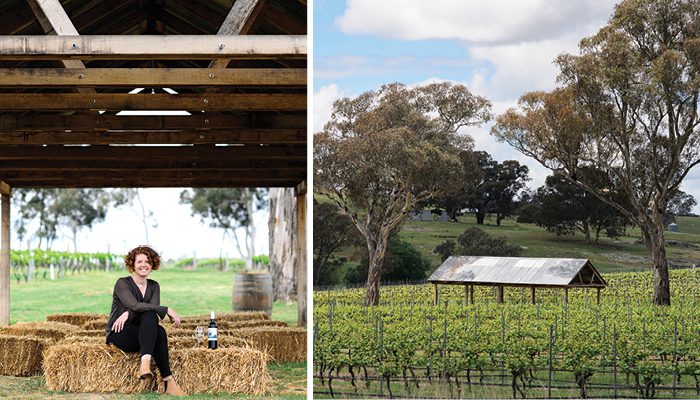
• This article first appeared in WBM – Australia’s Wine Business Magazine in November-December 2017. To subscribe to the magazine visit www.wbmonline.com.au/shop
Latest cover story
An Hour with Renae Hirsch, the quiet achiever in wine







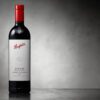
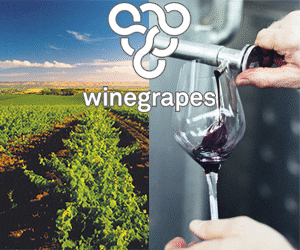
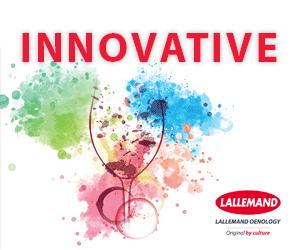
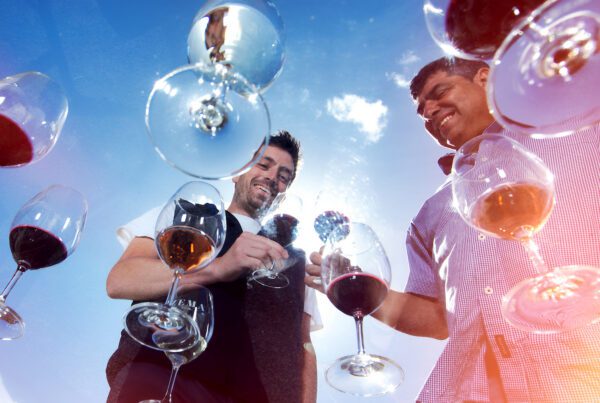
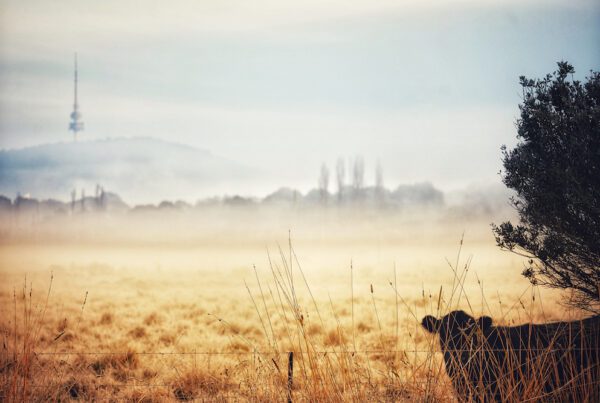
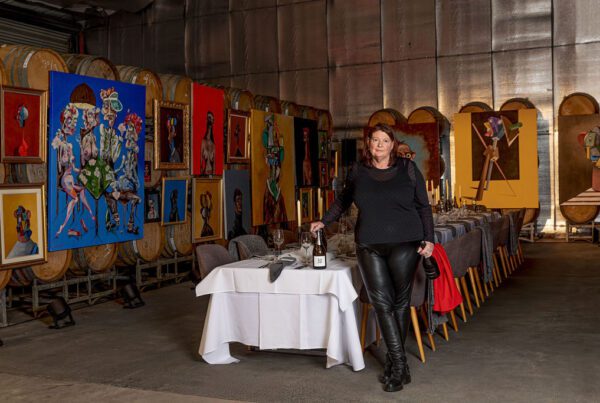
Recent Comments